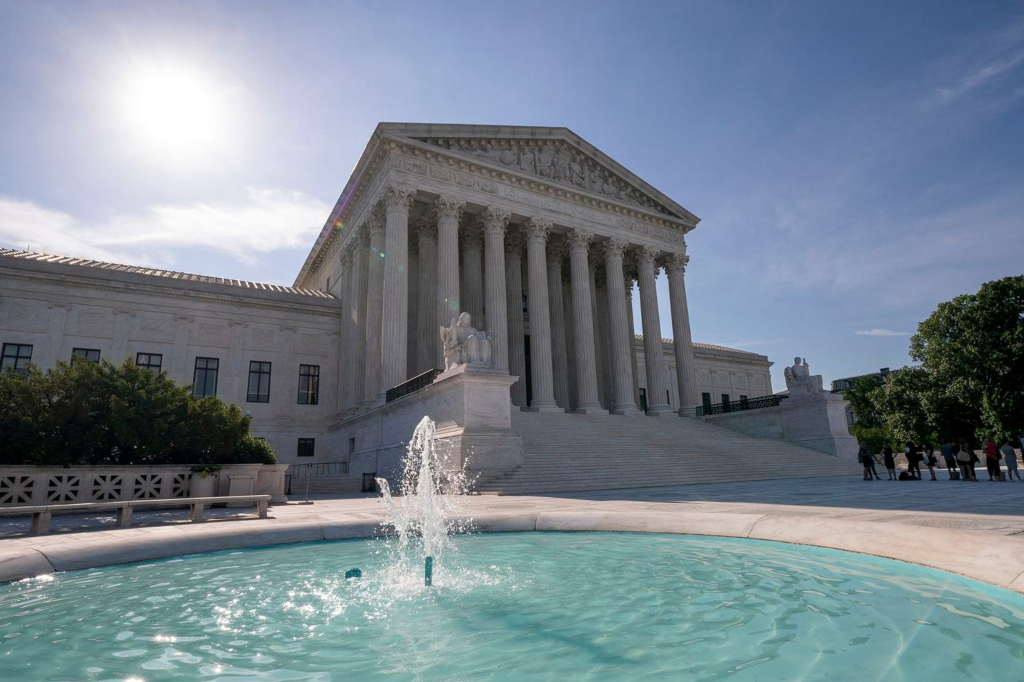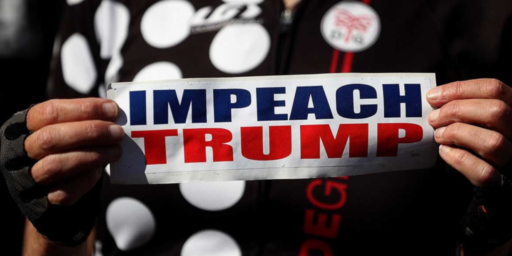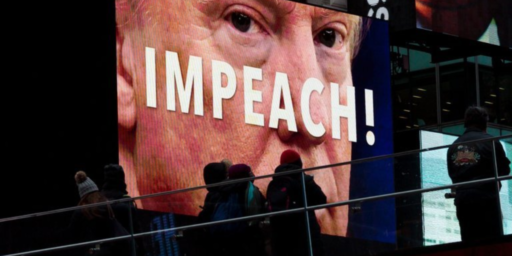Trump Gets A Temporary Victory At The Supreme Court
Late yesterday, the Supreme Court put a temporary hold on an order that would give Congress access to the President's financial documents.

The Supreme Court handed President Trump at least a temporary victory later yesterday as it blocked a lower court order that would have required President Trump’s accounting firm to turn over decades of the President’s financial records, potentially including his tax returns:
The Supreme Court on Monday blocked a House committee from immediately reviewing President Trump’s financial records, after the president’s lawyers agreed to an expedited review of a lower-court ruling granting access.
The court’s action signals that, even as Congress considers impeaching Trump, the court will undertake a more complete consideration of the legal powers of Congress and state prosecutors to investigate the president while he is in office.
The court instructed Trump’s lawyers to file a petition by Dec. 5 stating why the court should accept the case for full briefing and oral argument. If the petition is eventually denied, the lower-court ruling will go into effect. If accepted, the case probably will be heard this term, with a decision before the court adjourns at the end of June.
Lower courts have also sided with a New York district attorney seeking access to much of the same financial information for a grand jury investigation. The New York decision already was on hold, and did not require immediate Supreme Court action.
“This is a significant separation-of-powers clash between the president and Congress,” Trump’s personal lawyer William S. Consovoy said in a filing with the court in the case involving the House Oversight and Reform Committee.
He said Trump is “prepared to proceed on any schedule that the court deems appropriate.”
The House on Thursday told the Supreme Court that review was not necessary. It said the U.S. Court of Appeals for the D.C. Circuit’s decision saying the House committee was entitled to the information is straightforward and based upon Supreme Court precedent.
“The committee is investigating whether senior government officials, including the president, are acting in the country’s best interest and not in their own financial interest, whether federal agencies are operating free from financial conflicts and with accurate information, and whether any legislative reforms are needed to ensure that these fundamental principles are respected,” House General Counsel Douglas N. Letter told the justices in a filing Thursday.
He added: “Each day of delay harms Congress by depriving it of important information it needs to carry out its constitutional responsibilities.”
The subpoenas issued by the congressional committee and separately by Manhattan District Attorney Cyrus Vance Jr. are directed to the president’s longtime accounting firm Mazars USA. It has said it will comply with the eventual court order, so turning over the records would not require any action on the president’s part.
The subpoena from the House committee was issued in April, before that body took up a formal impeachment inquiry. But Letter said impeachment proceedings underscore the need for the court to move quickly.
Consovoy said the Supreme Court should not let such an “unprecedented” subpoena move forward without its explicit consideration and approval.
“Whether the committee was engaging in prohibited law enforcement, whether it was investigating in an area where it can pass constitutional legislation, and whether it had statutory authority are all important issues over which there is a serious legal dispute,” he wrote.
In October, a panel of the D.C. Circuit issued a 2-to-1 ruling that traced the long history of courts upholding Congress’s investigative authority.“We conclude that in issuing the challenged subpoena, the committee was engaged in a ‘legitimate legislative investigation,’ rather than an impermissible law-enforcement inquiry,” wrote Judge David S. Tatel, who was joined by Judge Patricia A. Millett. Both were nominated to the bench by Democratic presidents.
The high court’s stay, which applies only during the period that the Justices are determining whether or not it will take up the appeal, came in a case that was decided by the Court of Appeals for the D.C. Circuit last month. In that case, a three-judge panel upheld the ruling of a District Court Judge that Congress was entitled to see the documents being subpoenaed from Mazars, the accounting firm that Trump and his companies have used for decades.
In their ruling, the Appeals Court panel largely tracked the opinion issued earlier this year by District Court Judge Amit Mehta. Specifically, relying largely on precedent from the District Court and the Court of Appeals that has reasserted and enforced the authority of Congress to investigate the agencies of the Executive Branch and the President and his cohorts. As with Judge Mehta, the panel opinion does a very good job of summarizing that precedent. While a discussion of those precedents would be far too lengthy for a post such as this, suffice it to say that the Trump Administration had no legitimate legal basis on which to challenge this subpoena, and that’s a finding that arguably applies to any other subpoena Congress may issue which the Administration refuses to comply with, something that has become common since Judge Mehta issued his opinion earlier this year.
For example, with respect to many of the recent requests for documents that the Administration has rejected, the White House has relied on the supposed lack of a “legitimate legislative purpose” behind the request. This has most notably occurred with respect to the request and subpoena for President Trump’s tax records, which Secretary of the Treasury Steve Mnuchin has refused to comply with due to the alleged lack of a “legitimate legislative purpose” to the request. In some of its statements and pleadings, the Administration has claimed that the only “legitimate legislative purpose” that exists would be in connection with pending legislation. This is essentially the argument that the White House made in its recent letter to Congress regarding the ongoing impeachment inquiry, which it bizarrely called “unconstitutional.” The Administration’s position is obviously without merit given the fact that both the Constitution and existing Federal law give Congress the authority and arguably the duty to oversee the operations of the Executive Branch and to investigate potential wrongdoing by Executive Branch officials including, of course, the President himself. This investigatory authority gives Congress all of the “legitimate legislative purpose” it needs for the documents requests at issue in this case and in the others that the White House is seeking to block Congress’s legitimate power to investigate and act.
The appeals court ruling is especially in the context of the ongoing disputes between Congress and the Administration, especially now that we are now in the middle of an impeachment investigation. In this context, this argument that Congress lacks a legitimate purpose in its ruling is obviously without merit. If there is anything that has a legitimate legislative purpose, it is an impeachment inquiry, notwithstanding the “legal” argument recently made by the Administration. Because of this, one would hope that in future proceedings Congress does what it can to get the courts to expedite its proceedings. Today’s ruling comes some six months after the initial lawsuit was filed, and while that is fairly quick for proceedings in both the District Court and Court of Appeals, it isn’t quick enough. Courts have shown in the past that they are able to expedite rulings in important cases and there are few things more important than a Presidential impeachment inquiry.
These are the issues that the Supreme Court is being asked to decide if it takes up the appeal. While the answers seem rather self-evident, one cannot predict what will happen before the high court. For that reason, the court’s decision on whether it will even take up the appeal will have significant implications for several ongoing Congressional investigations, not the least of them being the impeachment inquiry itself.




